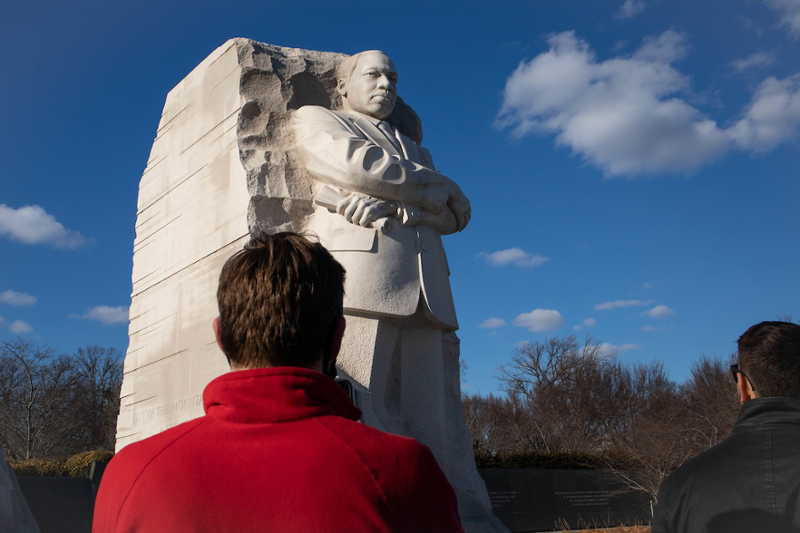What Street Do You Live On? Juneteenth Celebration for Texas, Our Nation, and the Human Story

"[Men] fear each other because they don't know each other,
and they don't know each other because they don't communicate with each other,
and they don't communicate with each other because they are separated from each other."
—Reverend Dr. Martin Luther King Jr.
In a casual conversation recently with a visitor at my church, I discovered our families live in the same part of the city. As we attempted to determine if we were neighbors, he asked, "What street do you live on?"
This question is consequential, for so many reasons.
I am convinced that a key part of overcoming what so easily divides us as a people is finding out what street we "live on"—talking and growing in vibrant relationships with others who are different from us, discovering their hopes, dreams, fears, and most certainly, learning their history.
On June 19, 1865, over 1,800 Union Soldiers led by General Gordon Granger arrived in Galveston, Texas with news that would advance the United States toward "a more perfect union."
More than 250,000 enslaved black people in the state of Texas had gained their freedom through the signing of the Emancipation Proclamation on January 1, 1863. In part, it stated that all enslaved people in the states currently engaged in rebellion against the Union "shall be then, thenceforward, and forever free." However, this freedom was not realized until over two years later.
When Confederate General Robert E. Lee surrendered in April 1865, Granger's troops were ready to finally make good on the freedom declared by the Emancipation Proclamation. Reading from General Order No. 3, Granger stated, "The people of Texas are informed that, in accordance with a proclamation from the Executive of the United States, slaves are free" (General Order No. 3, Headquarters District of Galveston, Texas, June 19, 1865). The importance of his actions cannot be overstated. Dallas Baptist University historian and U.S. history professor Michael Williams, Sr. says Granger never received full recognition for his valiant efforts not only on that day, but also for leading his troops in the rescue of Union Army soldiers at Chickamauga. "[His] blunt speech and manner," denied him such recognition.
Acclaimed Harvard historian Henry Louis Gates argues that the Union General "wasn't just a few months late..." because by the time such words of freedom rang out, "formalities aside, wasn't it all over, literally, but the shouting?" (Henry Louis Gates, What is Juneteenth?, theroot.com, June 17, 2013). By the time Granger heralded the news of freedom from the very steps where General Lee once stood, President Abraham Lincoln was dead; over 200,000 black people had enlisted to fight against the Confederacy; and the ink on the Emancipation Proclamation had long since dried.
There was "no instant magic" when Granger spoke the words to Texan slaves, argues Gates. In fact, slave-masters placed their business interests and profit margins ahead of the moral reckoning Lincoln signed into law. Attempts to bring self-worth and dignity to people of color continued to fall on deaf ears, and those who attempted to enforce the new law of the land did so at their own peril (Gates). The result was, as the late theologian Howard Thurman argues, "blacks continued to live with their backs against the wall" (Howard Thurman, Jesus and the Disinherited). It was a wall of subjugation, of unfair treatment based upon skin color; where African Americans were subjected to a whirlwind of pride and anger from white supremacists.
But as the years and decades followed the Emancipation Proclamation and Granger's June 19th announcement, freed slaves and subsequent generations of African Americans have set aside this date to tell stories of those who have gone before; gathering for picnics, parades, and other festivities to commemorate the historic event known as "Juneteenth." The holiday derives its name from the combination of "June" and "nineteenth." Also known as the "Second Emancipation" or "Freedom Day," it is the oldest holiday commemorating the ending of slavery in the United States.
Today, companies including NIKE, the National Football League (NFL), Vox Media, Uber, and Best Buy acknowledge Juneteenth as a paid holiday for their employees. Jack Dorsey, chief executive and founder of Twitter, said that Juneteenth is a day for "celebration, education and connection" ("Twitter and Square Make Juneteenth a Company Holiday," Neil Vigdor, June 18, 2020, The New York Times). Dorsey made this pronouncement the same day George Floyd was laid to rest after he was brutally murdered—over 9 minutes and 29 seconds—by a Minneapolis police officer.
Jemar Tisby, in his award winning book The Color of Compromise (2019), notes that honoring Juneteenth is beneficial for our society as whole, not just for the African American people. First, Tisby argues that it highlights freedom in the face of oppressive monuments and structures put into place to recognize dishonorable men who served an unjust cause. Secondly, honoring Juneteenth gives voice to one of the most important historical events in our nation's history; Juneteenth remains a defining moment for our nation and the shaping of her character. Thirdly, the events following the Emancipation Proclamation were watershed moments that put the nation on a path to fulfill the words inscribed in our Constitution and Bill of Rights: notably the Thirteenth Amendment of 1865, abolishing slavery in all territories and states; the Fourteenth Amendment of 1868, addressing citizenship rights and equal protection under the law; and the Fifteenth Amendment of 1870, granting citizens the right to vote, regardless of race.
I would add one additional benefit to our collective acknowledgment of Juneteenth: honoring this holiday reminds us of how far we've come, and of the work that remains. The African American quest for freedom and equal treatment under the law is not only a desperate quest of the past, but remains a present-day pursuit. Individuals such as Breonna Taylor, Ahmaud Arbery, Eric Garner, and George Floyd underline the need for that journey with their blood. Justice and fairness have become dramatic themes playing out in real time through the lenses of cell phone videos, police body cameras, and television news crews on the ground amid peaceful protests. Those same instruments have captured images of violent, angry, anti-government mobs cloaked in the American flag and political campaign paraphernalia, waving Christian flags paired with white nationalist symbols. Such civil unrest has brought us to what I've described as a defining moment in not only our nation's history, but the human story.
So much is at stake.
In 1979, Texas became the first state to make Juneteenth an official holiday. Since that time, over 40 states have followed in some fashion, recognizing the importance of this date. It is only fitting that the state that remained one of the staunchest supporters of injustice against the African American people, has taken steps to atone for what Martin Luther King Jr. once called the "black man's burden and the white man's shame." The weight of that burden is worn unequally, depending on the color of one's skin. Award winning historian Isabel Wilkerson discusses black migration: how African Americans traveled from the South to the northern and western parts of the country, in search of a better way of life and to relive themselves of such a burden. Wilkerson argues that "the people from Texas took Juneteenth Day to Los Angeles, Oakland, Seattle, and other places they went" (The Warmth of Other Suns, 2010)—folks from the state of Texas led the way in honoring Juneteenth.
Telling the story of a people engenders compassion and empathy toward those people; in this instance, the story of the African American people is worthy to be both told and heard by the collective conscience of our nation. Hearing these collective and individual stories—discovering the "street they live on"—has often helped to remove fear between groups of people who differ from one another with respect to race, culture, and ethnicity. These stories also remind us that we are part of a bigger collective, one where we are all made in the Imago Dei.
In Galveston, Texas there is a street called Emancipation Street. It used to be named for former Confederate military commander and Bayou City businessman Richard "Dick" Dowling. For years, members of his family and local citizens argued the street was named to pay tribute to Dowling's Irish heritage and his co-founding of the Houston City Fire Department. Nothing could be further from the truth. To add insult to injury, schools were named after him, and statues were erected in his honor. But many African Americans were familiar with a different story of who Dowling was; they were all too aware of the inhumane ethics he promoted, ethics based in hatred and violence. Dowling Street was a constant reminder of the violence and racism of the past, perpetrated by the former Confederate military leader along with others who acted with impunity.
In a 2017 Juneteenth ceremony, the name of the street was finally changed. Today, it is a street that Texans and all people of goodwill can not only be proud to talk about, but to live on, a place where they can share their lives with one another, and hear one another's stories.
As you encounter someone who looks different from you, particularly a person who is African American—whether in a grocery store, at your local Starbucks, after a worship experience, or on a golf course—my fervent prayer, in honor of Juneteenth 2021, is that you will pause and ask them this question: "What street do you live on?"
Biden signs a bill making Juneteenth a national holiday. Learn how Juneteenth became a Federal Holiday>>
Marcus "Goodie" Goodloe, Ph.D. is Senior Fellow for Ethics and Justice Institute for Global Engagement at Dallas Baptist University.





